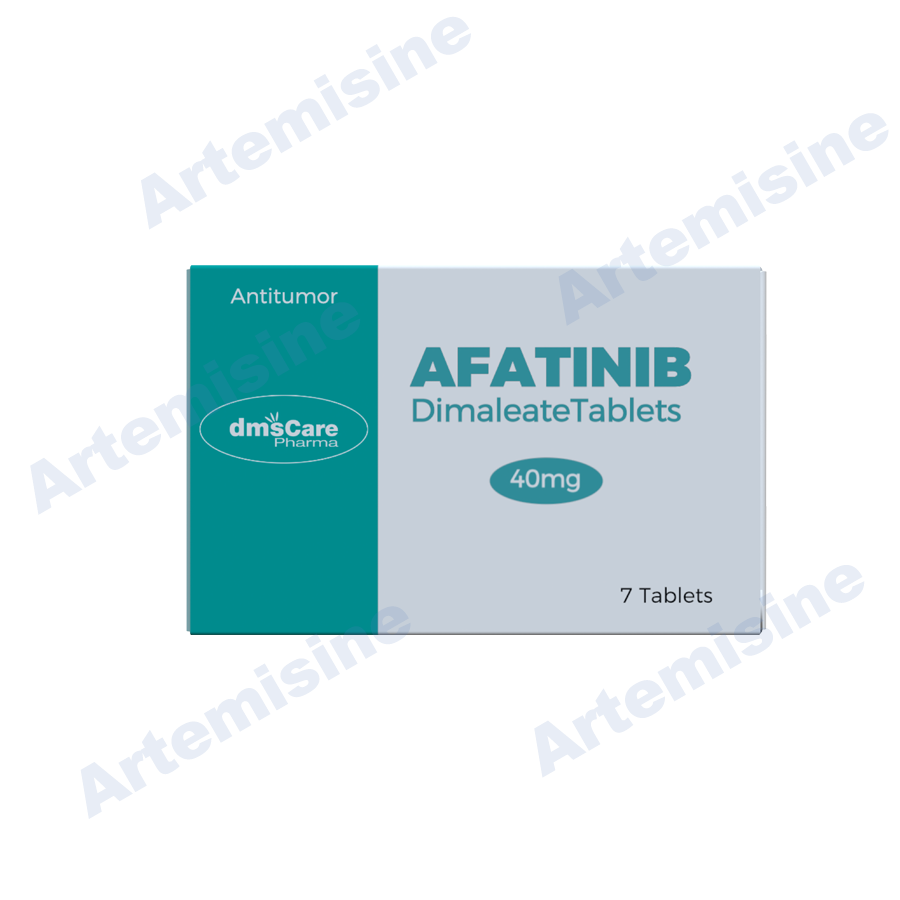Product Description
Products Name:
Afatinib dimaleate tablets
Contains:
Afatinib 40mg
Package:
7 tabltes / box
What Is Afatinib dimaleate tablets ?
Afatinib dimaleate tablets is a tyrosine kinase inhibitor used to treat non-small cell lung cancer (NSCLC) that has spread (metastasized), whose tumors have a genetic mutation called epidermal growth factor receptor (EGFR).
What Are Side Effects of Afatinib dimaleate tablets ?
Afatinib dimaleate tablets may cause serious side effects including:
- hives,
- difficulty breathing,
- swelling of your face, lips, tongue, or throat,
- new or worsening cough,
- fever,
- severe or ongoing diarrhea (lasting 2 days or longer),
- severe skin reaction that causes blistering and peeling,
- pain, redness, numbness, and peeling skin on your hands or feet,
- blisters or ulcers in your mouth,
- red or swollen gums,
- trouble swallowing,
- eye pain or redness,
- blurred vision,
- watery eyes,
- feeling like something is in your eye,
- increased sensitivity to light,
- stomach pain (upper right side),
- easy bruising,
- unusual bleeding,
- tiredness,
- dark urine,
- clay-colored stools,
- yellowing of the skin or eyes (jaundice),
- pounding heartbeats,
- fluttering in your chest,
- shortness of breath,
- swelling in your legs and ankles, and
- rapid weight gain
Get medical help right away, if you have any of the symptoms listed above.
Common side effects of Afatinib dimaleate tablets include:
- diarrhea,
- rash,
- blisters or other skin lesions or reactions,
- inflammation of the mouth and lips,
- chapped lips,
- mouth sores,
- infection of the skin around fingernails or toenails,
- dry skin,
- acne,
- decreased appetite,
- weight loss,
- nausea,
- vomiting,
- itching,
- urinary tract or bladder infection,
- bloody nose,
- runny nose,
- fever, or
- pinkeye (conjunctivitis).
Seek medical care or call 911 at once if you have the following serious side effects:
- Serious eye symptoms such as sudden vision loss, blurred vision, tunnel vision, eye pain or swelling, or seeing halos around lights;
- Serious heart symptoms such as fast, irregular, or pounding heartbeats; fluttering in your chest; shortness of breath; and sudden dizziness, lightheartedness, or passing out;
- Severe headache, confusion, slurred speech, arm or leg weakness, trouble walking, loss of coordination, feeling unsteady, very stiff muscles, high fever, profuse sweating, or tremors.
This document does not contain all possible side effects and others may occur. Check with your physician for additional information about side effects.
Dosage for Afatinib dimaleate tablets
The recommended dose of Afatinib dimaleate tablets is 40 mg orally once daily at least 1 hour before or 2 hours after a meal, until the disease progresses or the drug is no longer tolerated.
What Drugs, Substances, or Supplements Interact with Gilotrif?
Gilotrif may interact with
- ritonavir,
- cyclosporine A,
- ketoconazole,
- itraconazole,
- erythromycin,
- verapamil,
- quinidine,
- tacrolimus,
- nelfinavir,
- saquinavir,
- amiodarone,
- rifampicin,
- carbamazepine,
- phenytoin,
- phenobarbital, or
- St. John’s wort
Tell your doctor all medications and supplements you use.
Afatinib dimaleate tablets During Pregnancy and Breastfeeding
Afatinib dimaleate tablets should not be used during pregnancy. It can harm a fetus. It is unknown if this drug passes into breast milk. Consult your doctor before breastfeeding.
Additional Information
Our Afatinib dimaleate tablets Side Effects Drug Center provides a comprehensive view of available drug information on the potential side effects when taking this medication.
